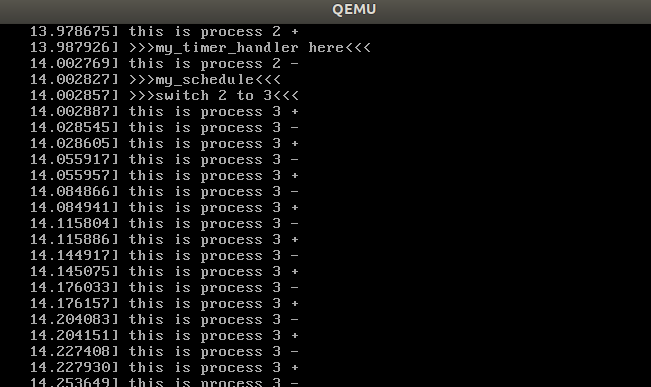基于mykernel 2.0编写一个操作系统内核
1.按照https://github.com/mengning/mykernel 的说明配置mykernel 2.0,熟悉Linux内核的编译;
在Ubuntu 18.04中配置mykernel 2.0
wget https://raw.github.com/mengning/mykernel/master/mykernel-2.0_for_linux-5.4.34.patch sudo apt install axel axel -n 20 https://mirrors.edge.kernel.org/pub/linux/kernel/v5.x/linux-5.4.34.tar.xz xz -d linux-5.4.34.tar.xz tar -xvf linux-5.4.34.tar cd linux-5.4.34 patch -p1 < ../mykernel-2.0_for_linux-5.4.34.patch sudo apt install build-essential libncurses-dev bison flex libssl-dev libelf-dev make defconfig # Default configuration is based on 'x86_64_defconfig' make -j$(nproc) sudo apt install qemu # install QEMU qemu-system-x86_64 -kernel arch/x86/boot/bzImage
2.基于mykernel 2.0编写一个操作系统内核,参照https://github.com/mengning/mykernel 提供的范例代码
首先在mykernel目录下增加一个mypcb.h 头文件,用来定义进程控制块,也就是进程结构体的定义,在Linux内核中是struct tast_struct结构体
/*
* linux/mykernel/mypcb.h
*/
#define MAX_TASK_NUM 4
#define KERNEL_STACK_SIZE 1024*8
/* CPU-specific state of this task */
struct Thread {
unsigned long ip;
unsigned long sp;
};
typedef struct PCB{
int pid;
volatile long state; /* -1 unrunnable, 0 runnable, >0 stopped */
char stack[KERNEL_STACK_SIZE];
/* CPU-specific state of this task */
struct Thread thread;
unsigned long task_entry;
struct PCB *next;
}tPCB;
void my_schedule(void);
对mymain.c进行修改,这里是mykernel内核代码的入口,负责初始化内核的各个组成部分
其中my_process函数,用来作为进程的代码模拟一个个进程
/*
* linux/mykernel/mymain.c
*
* Kernel internal my_start_kernel
*
* Copyright (C) 2013 Mengning
*
*/
#include <linux/types.h>
#include <linux/module.h>
#include <linux/proc_fs.h>
#include <linux/kernel.h>
#include <linux/syscalls.h>
#include <linux/stackprotector.h>
#include <linux/string.h>
#include <linux/ctype.h>
#include <linux/delay.h>
#include <linux/ioport.h>
#include <linux/init.h>
#include <linux/initrd.h>
#include <linux/acpi.h>
#include <linux/tty.h>
#include <linux/percpu.h>
#include <linux/kmod.h>
#include <linux/vmalloc.h>
#include <linux/kernel_stat.h>
#include <linux/start_kernel.h>
#include <linux/security.h>
#include <linux/smp.h>
#include <linux/profile.h>
#include <linux/rcupdate.h>
#include <linux/moduleparam.h>
#include <linux/kallsyms.h>
#include <linux/writeback.h>
#include <linux/cpu.h>
#include <linux/cpuset.h>
#include <linux/cgroup.h>
#include <linux/efi.h>
#include <linux/tick.h>
#include <linux/interrupt.h>
#include <linux/taskstats_kern.h>
#include <linux/delayacct.h>
#include <linux/unistd.h>
#include <linux/rmap.h>
#include <linux/mempolicy.h>
#include <linux/key.h>
#include <linux/buffer_head.h>
#include <linux/debug_locks.h>
#include <linux/debugobjects.h>
#include <linux/lockdep.h>
#include <linux/kmemleak.h>
#include <linux/pid_namespace.h>
#include <linux/device.h>
#include <linux/kthread.h>
#include <linux/sched.h>
#include <linux/signal.h>
#include <linux/idr.h>
#include <linux/kgdb.h>
#include <linux/ftrace.h>
#include <linux/async.h>
#include <linux/sfi.h>
#include <linux/shmem_fs.h>
#include <linux/slab.h>
#include <linux/perf_event.h>
#include <linux/file.h>
#include <linux/ptrace.h>
#include <linux/blkdev.h>
#include <linux/elevator.h>
#include <asm/io.h>
#include <asm/bugs.h>
#include <asm/setup.h>
#include <asm/sections.h>
#include <asm/cacheflush.h>
#ifdef CONFIG_X86_LOCAL_APIC
#include <asm/smp.h>
#endif
#include "mypcb.h"
tPCB task[MAX_TASK_NUM];
tPCB * my_current_task = NULL;
volatile int my_need_sched = 0;
void my_process(void);
void __init my_start_kernel(void)
{
int pid = 0;
int i;
/* Initialize process 0*/
task[pid].pid = pid;
task[pid].state = 0;/* -1 unrunnable, 0 runnable, >0 stopped */
task[pid].task_entry = task[pid].thread.ip = (unsigned long)my_process;
task[pid].thread.sp = (unsigned long)&task[pid].stack[KERNEL_STACK_SIZE-1];
task[pid].next = &task[pid];
/*fork more process */
for(i=1;i<MAX_TASK_NUM;i++)
{
memcpy(&task[i],&task[0],sizeof(tPCB));
task[i].pid = i;
task[i].state = 0;
task[i].thread.sp = (unsigned long)&task[i].stack[KERNEL_STACK_SIZE-1];
task[i].next = task[i-1].next;
task[i-1].next = &task[i];
}
/* start process 0 by task[0] */
pid = 0;
my_current_task = &task[pid];
asm volatile(
"movq %1,%%rsp\n\t" /* set task[pid].thread.sp to rsp */
"pushq %1\n\t" /* push rbp */
"pushq %0\n\t" /* push task[pid].thread.ip */
"ret\n\t" /* pop task[pid].thread.ip to rip */
:
: "c" (task[pid].thread.ip),"d" (task[pid].thread.sp) /* input c or d mean %ecx/%edx*/
);
}
void my_process(void)
{
int i = 0;
while(1)
{
i++;
if(i%10000000 == 0)
{
printk(KERN_NOTICE "this is process %d -\n",my_current_task->pid);
if(my_need_sched == 1)
{
my_need_sched = 0;
my_schedule();
}
printk(KERN_NOTICE "this is process %d +\n",my_current_task->pid);
}
}
}
时钟中断处理过程中记录时间片。对myinterrupt.c中修改my_timer_handler用来记录时间片。
其中进程切换的代码是my_schedule(void)函数
/*
* linux/mykernel/myinterrupt.c
*
* Kernel internal my_timer_handler
*
* Copyright (C) 2013 Mengning
*
*/
#include <linux/kernel_stat.h>
#include <linux/export.h>
#include <linux/interrupt.h>
#include <linux/percpu.h>
#include <linux/init.h>
#include <linux/mm.h>
#include <linux/swap.h>
#include <linux/pid_namespace.h>
#include <linux/notifier.h>
#include <linux/thread_info.h>
#include <linux/time.h>
#include <linux/jiffies.h>
#include <linux/posix-timers.h>
#include <linux/cpu.h>
#include <linux/syscalls.h>
#include <linux/delay.h>
#include <linux/tick.h>
#include <linux/kallsyms.h>
#include <linux/irq_work.h>
#include <linux/sched.h>
#include <linux/sched/sysctl.h>
#include <linux/slab.h>
#include <asm/uaccess.h>
#include <asm/unistd.h>
#include <asm/div64.h>
#include <asm/timex.h>
#include <asm/io.h>
#include "mypcb.h"
extern tPCB task[MAX_TASK_NUM];
extern tPCB * my_current_task;
extern volatile int my_need_sched;
volatile int time_count = 0;
/*
* Called by timer interrupt.
*/
void my_timer_handler(void)
{
if(time_count%1000 == 0 && my_need_sched != 1)
{
printk(KERN_NOTICE ">>>my_timer_handler here<<<\n");
my_need_sched = 1;
}
time_count ++ ;
return;
}
void my_schedule(void)
{
tPCB * next;
tPCB * prev;
if(my_current_task == NULL
|| my_current_task->next == NULL)
{
return;
}
printk(KERN_NOTICE ">>>my_schedule<<<\n");
/* schedule */
next = my_current_task->next;
prev = my_current_task;
if(next->state == 0)/* -1 unrunnable, 0 runnable, >0 stopped */
{
my_current_task = next;
printk(KERN_NOTICE ">>>switch %d to %d<<<\n",prev->pid,next->pid);
/* switch to next process */
asm volatile(
"pushq %%rbp\n\t" /* save rbp of prev */
"movq %%rsp,%0\n\t" /* save rsp of prev */
"movq %2,%%rsp\n\t" /* restore rsp of next */
"movq $1f,%1\n\t" /* save rip of prev */
"pushq %3\n\t"
"ret\n\t" /* restore rip of next */
"1:\t" /* next process start here */
"popq %%rbp\n\t"
: "=m" (prev->thread.sp),"=m" (prev->thread.ip)
: "m" (next->thread.sp),"m" (next->thread.ip)
);
}
return;
}

3.简要分析操作系统内核核心功能及运行工作机制
系统启动后,首先执行mymain.c中的my_start_kernel函数,启动进程0,然后开始执行my_process(void)函数。在myinterrupt.c文件中定义了一个时间大小为1000,如果时间轮转完成并且my_need_sched不等于1,就把my_need_sched设为1,然后mymain.c文件中my_process函数将my_need_sched设为0,调用myinterrupt.c文件中的my_schedule函数,完成进程切换



 浙公网安备 33010602011771号
浙公网安备 33010602011771号